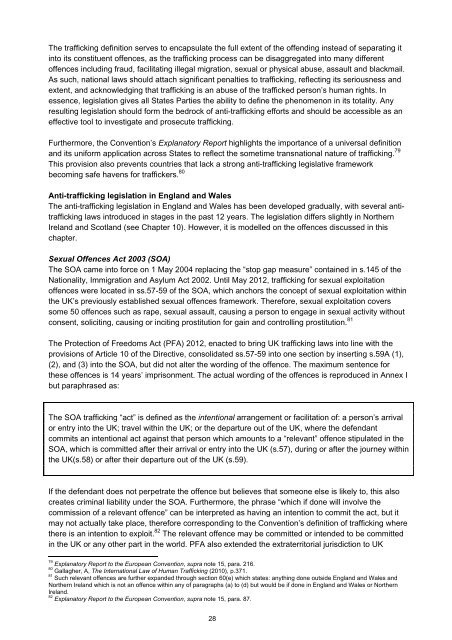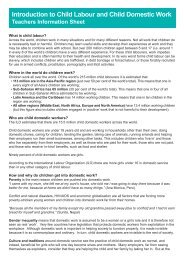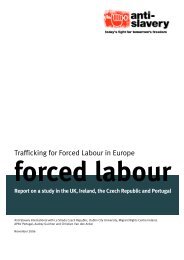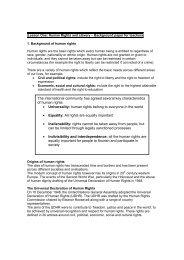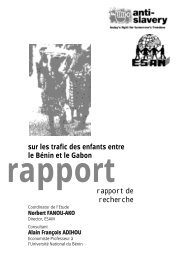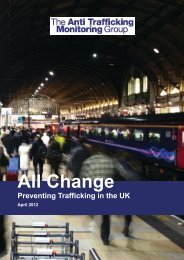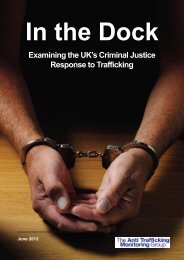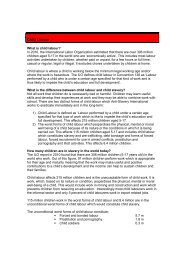The trafficking definition serves to encapsulate <strong>the</strong> full extent of <strong>the</strong> offending instead of separating itinto its constituent offences, as <strong>the</strong> trafficking process can be disaggregated into many differentoffences including fraud, facilitating illegal migration, sexual or physical abuse, assault and blackmail.As such, national laws should attach significant penalties to trafficking, reflecting its seriousness andextent, and acknowledging that trafficking is an abuse of <strong>the</strong> trafficked person’s human rights. <strong>In</strong>essence, legislation gives all States Parties <strong>the</strong> ability to define <strong>the</strong> phenomenon in its totality. Anyresulting legislation should form <strong>the</strong> bedrock of anti-trafficking efforts and should be accessible as aneffective tool to investigate and prosecute trafficking.Fur<strong>the</strong>rmore, <strong>the</strong> Convention’s Explanatory Report highlights <strong>the</strong> importance of a universal definitionand its uniform application across States to reflect <strong>the</strong> sometime transnational nature of trafficking. 79This provision also prevents countries that lack a strong anti-trafficking legislative frameworkbecoming safe havens for traffickers. 80Anti-trafficking legislation in England and WalesThe anti-trafficking legislation in England and Wales has been developed gradually, with several antitraffickinglaws introduced in stages in <strong>the</strong> past 12 years. The legislation differs slightly in Nor<strong>the</strong>rnIreland and Scotland (see Chapter 10). However, it is modelled on <strong>the</strong> offences discussed in thischapter.Sexual Offences Act 2003 (SOA)The SOA came into force on 1 May 2004 replacing <strong>the</strong> “stop gap measure” contained in s.145 of <strong>the</strong>Nationality, Immigration and Asylum Act 2002. Until May 2012, trafficking for sexual exploitationoffences were located in ss.57-59 of <strong>the</strong> SOA, which anchors <strong>the</strong> concept of sexual exploitation within<strong>the</strong> UK’s previously established sexual offences framework. Therefore, sexual exploitation coverssome 50 offences such as rape, sexual assault, causing a person to engage in sexual activity withoutconsent, soliciting, causing or inciting prostitution for gain and controlling prostitution. 81The Protection of Freedoms Act (PFA) 2012, enacted to bring UK trafficking laws into line with <strong>the</strong>provisions of Article 10 of <strong>the</strong> Directive, consolidated ss.57-59 into one section by inserting s.59A (1),(2), and (3) into <strong>the</strong> SOA, but did not alter <strong>the</strong> wording of <strong>the</strong> offence. The maximum sentence for<strong>the</strong>se offences is 14 years’ imprisonment. The actual wording of <strong>the</strong> offences is reproduced in Annex Ibut paraphrased as:The SOA trafficking “act” is defined as <strong>the</strong> intentional arrangement or facilitation of: a person’s arrivalor entry into <strong>the</strong> UK; travel within <strong>the</strong> UK; or <strong>the</strong> departure out of <strong>the</strong> UK, where <strong>the</strong> defendantcommits an intentional act against that person which amounts to a “relevant” offence stipulated in <strong>the</strong>SOA, which is committed after <strong>the</strong>ir arrival or entry into <strong>the</strong> UK (s.57), during or after <strong>the</strong> journey within<strong>the</strong> UK(s.58) or after <strong>the</strong>ir departure out of <strong>the</strong> UK (s.59).If <strong>the</strong> defendant does not perpetrate <strong>the</strong> offence but believes that someone else is likely to, this alsocreates criminal liability under <strong>the</strong> SOA. Fur<strong>the</strong>rmore, <strong>the</strong> phrase “which if done will involve <strong>the</strong>commission of a relevant offence” can be interpreted as having an intention to commit <strong>the</strong> act, but itmay not actually take place, <strong>the</strong>refore corresponding to <strong>the</strong> Convention’s definition of trafficking where<strong>the</strong>re is an intention to exploit. 82 The relevant offence may be committed or intended to be committedin <strong>the</strong> UK or any o<strong>the</strong>r part in <strong>the</strong> world. PFA also extended <strong>the</strong> extraterritorial jurisdiction to UK79Explanatory Report to <strong>the</strong> European Convention, supra note 15, para. 216.80Gallagher, A, The <strong>In</strong>ternational Law of Human Trafficking (2010), p.371.81Such relevant offences are fur<strong>the</strong>r expanded through section 60(e) which states: anything done outside England and Wales andNor<strong>the</strong>rn Ireland which is not an offence within any of paragraphs (a) to (d) but would be if done in England and Wales or Nor<strong>the</strong>rnIreland.82Explanatory Report to <strong>the</strong> European Convention, supra note 15, para. 87.28
nationals who commit trafficking offences anywhere in <strong>the</strong> world. 83 This also altered <strong>the</strong> Asylum andImmigration (Treatment of Claimants, etc.) Act 2004 in <strong>the</strong> same way. 84The UK has restricted its interpretation of <strong>the</strong> international trafficking definition by requiring only <strong>the</strong>establishment of <strong>the</strong> “act” and “purpose”, excluding <strong>the</strong> need for ascertaining <strong>the</strong> means elementwhich operates to explicitly negate <strong>the</strong> supposed consent of <strong>the</strong> trafficked person to <strong>the</strong>ir exploitation.On <strong>the</strong> face of it, it may appear to ease <strong>the</strong> burden in establishing <strong>the</strong> offence by only requiring thattwo elements are evidenced. However, some of <strong>the</strong> relevant offences contained in Part One of <strong>the</strong>SOA such as rape, require that <strong>the</strong> trafficked person did not consent to <strong>the</strong> act, <strong>the</strong>refore <strong>the</strong>requirement of <strong>the</strong> means encroaches indirectly into <strong>the</strong> trafficking offence if rape is selected as <strong>the</strong>relevant offence. 85 However, it is common for both <strong>the</strong> prosecution and defence to draw on <strong>the</strong>trafficked person’s consent to <strong>the</strong>ir trafficking in such trials to substantiate <strong>the</strong>ir case. This wasconfirmed by <strong>the</strong> UK in <strong>the</strong> Council of Europe Group of Experts on Action against Trafficking inHuman Beings (GRETA) 86 report: “<strong>the</strong> British authorities have stated that all <strong>the</strong> means under <strong>the</strong>Convention are inherent in trafficking without being articulated in <strong>the</strong> legislation. By establishing how atrafficker exploits <strong>the</strong> vulnerability of a victim through force, threats or deception, this would also coverfraud, abuse of power, coercion or abduction, all of which are means acknowledged in caseprecedent”. 87 Unfortunately, as <strong>the</strong> concepts of deception or o<strong>the</strong>r forms of coercion do not appear inthis offence’s equation, this may result in <strong>the</strong> misunderstanding of trafficking as a crime by CJS actorsand a lay jury.Many of <strong>the</strong> interviewed participants stated that <strong>the</strong> requirement for <strong>the</strong> intention to exploit beingsimultaneously and continuously present when facilitating or assisting travel, frustrates <strong>the</strong> usage oftrafficking legislation. <strong>In</strong> effect, a chain of evidence demonstrating continuous intention which begins in<strong>the</strong> country of origin and ends with <strong>the</strong> transfer to <strong>the</strong> site of exploitation is needed. Such evidence isgenerally lacking, <strong>the</strong>refore making if difficult to prosecute under <strong>the</strong> legislation. One legal practitionercommented in relation to intentional acts in <strong>the</strong> context of Asylum and Immigration (Treatment ofClaimants, etc.) Act 2004 (discussed below) but equally applicable to <strong>the</strong> SOA:“I have to say in cases I‘ve prosecuted, I’ve looked at it and concluded it would be easier not to use thatlegislation … first of all with s.4 you need to prove <strong>the</strong> intention to exploit on entry into <strong>the</strong> UK. Whereas ifyou break it down into its constituent parts … you did enter illegally, you did help with facilitation and <strong>the</strong>nthis went on to happen. It’s easier to break it down into those parts than proving intention of coming into <strong>the</strong>UK as this can be a lot more difficult”.Moreover, as discussed in Chapter 1, traffickers may structure and divide tasks in <strong>the</strong>ir networks tocircumvent <strong>the</strong> legislation by ensuring different individuals arrange or facilitate travel to <strong>the</strong> endexploiter of <strong>the</strong> trafficked person. Without evidence to demonstrate a relationship between <strong>the</strong>arranger/facilitator in <strong>the</strong> source country and exploiter in <strong>the</strong> UK, <strong>the</strong> chain of evidence illustratingcontinuous intention is broken and necessitates CJS actors to utilise legislation which falls out of <strong>the</strong>trafficking framework.Existing trafficking legislation is fur<strong>the</strong>r confused by <strong>the</strong> fact that if <strong>the</strong>re is an intention to assist orfacilitate <strong>the</strong> “trafficked person’s” travel for <strong>the</strong> purposes of controlling, causing or inciting prostitution83S.109 of <strong>the</strong> PFA.84S.110 of <strong>the</strong> PFA.85See evidential and conclusive presumptions about consent, ss.75 & 76 of <strong>the</strong> SOA. The offence of rape requires that <strong>the</strong> victim didnot consent to <strong>the</strong> offences but this is limited to evidential presumptions that violence was used or was threatened against <strong>the</strong> victimbefore <strong>the</strong> offence took place, <strong>the</strong> victim has a disability, <strong>the</strong>y were asleep, <strong>the</strong>y were detained by <strong>the</strong> defendant or <strong>the</strong> defendant hasadministered a substance to <strong>the</strong> victim.86GRETA is responsible for monitoring implementation of <strong>the</strong> Council of Europe Convention on Action against Trafficking in HumanBeings by <strong>the</strong> Parties. GRETA regularly publishes reports evaluating <strong>the</strong> measures taken by <strong>the</strong> Parties and those Parties which donot fully respect <strong>the</strong> measures contained in <strong>the</strong> Convention will be required to step up <strong>the</strong>ir action.87GRETA, Report concerning <strong>the</strong> implementation of <strong>the</strong> Council of Europe Convention on Action against Trafficking in Human Beingsby <strong>the</strong> United Kingdom: First evaluation round (Strasbourg, 12 September 2012), p.69.29
- Page 1 and 2: In the DockExamining the UK’s Cri
- Page 3 and 4: AcknowledgementsThis report was mad
- Page 5 and 6: PrefaceIn May 2009, a group of nine
- Page 7 and 8: Misconceptions around exploitation
- Page 9 and 10: Acronyms and abbreviations frequent
- Page 11 and 12: Executive SummaryIn the Dock is The
- Page 13 and 14: Furthermore, the current legislatio
- Page 15 and 16: The ATMG was made aware of some cas
- Page 17 and 18: • Introduce mandatory child-speci
- Page 19 and 20: • The UK’s ability to meet the
- Page 21 and 22: Traffickers’ primary motivation i
- Page 23 and 24: • Money launderers - turn profits
- Page 25 and 26: out to perpetuate the exploitative
- Page 27 and 28: [their] own enslavement” is as fu
- Page 29: Chapter 2: UK Anti-Trafficking Legi
- Page 33 and 34: Like the SOA, the “act” element
- Page 35 and 36: (b) D requires another person to pe
- Page 37 and 38: Forced or compulsory labourThe defi
- Page 39 and 40: ConclusionAs a consequence of the s
- Page 41 and 42: concerningly, the number of convict
- Page 43 and 44: women who were recruited in Poland
- Page 45 and 46: Chapter 4: Identifying trafficking
- Page 47 and 48: Misconceptions around exploitationT
- Page 49 and 50: espond inadequately to a trafficked
- Page 51 and 52: multi-agency teams was described by
- Page 53 and 54: Josie Connors. 179 In summary, inte
- Page 55 and 56: defending a trafficked person for f
- Page 57 and 58: “[B]ecause the NRM decision is on
- Page 59 and 60: PTSD. 196 A Consultant Psychiatrist
- Page 61 and 62: etween the client and the police, i
- Page 63 and 64: Regular communication needs to be s
- Page 65 and 66: Priority planningA particular issue
- Page 67 and 68: Chapter 6: Multi-agency and interna
- Page 69 and 70: canvassing for tarmacking opportuni
- Page 71 and 72: Despite this, it would appear that
- Page 73 and 74: Good practice - Operation Golf 229O
- Page 75 and 76: Chapter 7: Criminal proceedingsThe
- Page 77 and 78: Law enforcement working on the case
- Page 79 and 80: trafficking require particular unde
- Page 81 and 82:
JuryPractitioners suggested that th
- Page 83 and 84:
years”. 258 Ambiguity within the
- Page 85 and 86:
officer stated that not all judges
- Page 87 and 88:
jurors to be assisted with expert e
- Page 89 and 90:
Good feedback was received from sem
- Page 91 and 92:
The Convention does recognise that
- Page 93 and 94:
Another option for trafficked victi
- Page 95 and 96:
There are two models with respect t
- Page 97 and 98:
1. Is there clear evidence that the
- Page 99 and 100:
decision can be taken into account
- Page 101 and 102:
also entails being “alert to the
- Page 103 and 104:
In some cases concerns were even ra
- Page 105 and 106:
Chapter 9: Prosecuting child traffi
- Page 107 and 108:
However, many children are not refe
- Page 109 and 110:
trafficking”. 352 It states: “W
- Page 111 and 112:
Previous research has found that th
- Page 113 and 114:
children as well as assisting in pr
- Page 115 and 116:
Child trafficking trainingThere is
- Page 117 and 118:
were too traumatic to involve them
- Page 119 and 120:
committed by a child whilst in a co
- Page 121 and 122:
• Introduce mandatory child-speci
- Page 123 and 124:
IdentificationThe PSNI is the main
- Page 125 and 126:
participants suggest that this is b
- Page 127 and 128:
The PPS stated that the reasons for
- Page 129 and 130:
this research was aware of potentia
- Page 131 and 132:
convictions of traffickers prosecut
- Page 133 and 134:
Possibly in response to certain hur
- Page 135 and 136:
espectively. In addition to custodi
- Page 137 and 138:
Conclusion and RecommendationsThe A
- Page 139 and 140:
CRIMINAL PROCEEDINGS• Ensure that
- Page 141 and 142:
Crown Prosecution Service, Legal Gu
- Page 143 and 144:
Herman. J. Trauma and Recovery: The
- Page 145 and 146:
Annex I: Trafficking and other form
- Page 147 and 148:
(a) on summary conviction, to impri
- Page 149 and 150:
(b) which country is the country of
- Page 151 and 152:
2009 Istvan Kalocsai (Snr)MetS.57 o
- Page 153 and 154:
2009 causing actual bodily harm, su
- Page 155 and 156:
Skirmantas Kvedaras Feed, 2010 Rape
- Page 157 and 158:
2012 Ahdel Ali (24)Mubarek Ali (29)
- Page 159 and 160:
Annex III: The CPS’s Seven Stages
- Page 161 and 162:
159


